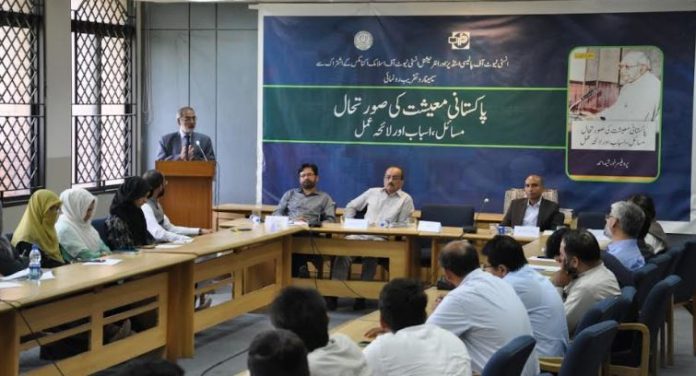DNA
Islamabad, July 27, 2022: It is high time that Pakistan develops an ‘Islamabad Consensus’, as an alternative to the Washington Consensus, to escape the trap of foreign dependency. As no single entity can bring improvement in the economic system, damaged by its dependency on international biddings, the country must develop a national consensus, charter of economy, proper economic perspective, structural reforms, and long-term planning based on a transformative vision.
These views were shared by speakers during a seminar cum book launching ceremony of IPS Press publication titled Pakistani Maeshat ki Surat-e-Haal: Masayel, Asbaab aur Lahia-e-Amal (State of Pakistan’s Economy: Problems, Causes and Plan of Action), the sixth book of the Armughan-e-Khurshid series, which compile the writings and speeches of Prof. Khurshid Ahmad, veteran politician, eminent scholar, economist, and patron-in-chief and founding chairman of Institute of Policy Studies (IPS), Islamabad on a variety of subjects of national significance.
The ceremony, jointly organized by IPS and the International Institute of Islamic Economics (IIIE) of the International Islamic University (IIUI), Islamabad, was co-chaired by Khalid Rahman, chairman IPS, and Prof. Dr. Ayaz Afsar, vice president IIUI, and addressed by Dr. Abdul Rashid, director general IIIE, Dr. Syed Tahir Hijazi, senior academician and former Member (Governance), Planning Commission of Pakistan, and Dr. Miraj-ul-Haq, assistant professor IIIE.
While applauding the work of Prof. Khurshid Ahmad, Dr. Abdul Rashid stated that his insights on the issues of national concern and efforts towards national development are commendable. He concurred that economic security and the implementation of structural reforms are the need of the hour.
Presenting a concise review of the book, Dr. Miraj-ul-Haq appreciated how the author has discussed the striking questions on the economic performance of Pakistan at different times. He emphasized that the reasons why the country showed good economic performance at certain times and bad at others must be analyzed.
Relating to this, he pointed out that external factors, including foreign debt, foreign aid, and remittances, and internal factors, including poor governance and underutilization of indigenous resources, are the key causes of the country’s low economic performance. He further stated that flawed strategies have pushed Pakistan into deep structural issues to the point where it seems to be very close to default.
As a way forward, the country, instead of providing a cosmetic arrangement of policies, must forge practical and long-term policies. He was of the view that dependency on foreign entities is damaging Pakistan’s economy. He further asserted that a new dynamic approach, based on national consensus, is the need of the hour.
He suggested formulating an ‘Islamabad Consensus’, as an alternative to the Washington Consensus and Beijing Consensus, by pushing all the stakeholders, civil and military bureaucracies, and all political parties to discuss the economic issues in order to devise national economic prescriptions. An economic charter should be formulated by holding a grand dialogue; only then Pakistan would be able to realize its unfulfilled economic potential.
Dr. Syed Tahir Hijazi acknowledged Prof. Khurshid’s contributions as a statesman and economist towards highlighting public concerns on the floor of the Senate for more than 22 years. He lauded the author for presenting his insights in the book, dealing with the structure of economic issues, and efficiently discussing several neglected and under-discussed economic aspects. He was in sync with the author’s views on several issues like interest on loans, public transport, and POL prices. He asserted that the major flaws in the country’s economic system are the absence of national consensus, governance issues, and the lack of a strategic direction in economic policy formulation.
As a way forward, the government needs to seek alternative solutions, effectively utilize its resources, and formulate long-term planning based on a vision to transform the system and introduce new frameworks to drive the economy ahead. He further emphasized that economic decision-making at the governmental level should be collective with the involvement of relevant economic experts.
Prof. Dr. Ayaz Afsar referred to several indicative statements from the book that pointed out the despondent realities of the economic system. He was of the view that these sad realities of the economic system are because of the lack of dialogue. He pointed out that the economic situation always suffers when opinions and decisions are imposed, instead of being discussed. The timely response should be to hold collective dialogues and develop a proper perspective.
While apprising the audience of the current realities, Khalid Rahman observed that economic activities can’t be conducted in isolation from other spheres of national policy discourse. In this regard, political stability is important as it predicts the consistency of policies on national economic issues. However, at the same time, the strategic issues can’t be ignored. Hence, the need is to deal with economy as a package.
He stated that the absence of an ultimate goal, adhocism in policy formulation, the crisis of dependency, the absence of self-reliance, imbalanced priorities, flawed strategies, and poor governance are some of the key issues damaging the country’s economy. As a way forward, Pakistan must neutralize the prevailing polarity, of which the economy is the victim, and develop a national consensus. Moreover, consistency of policies and effective utilization of resources must be ensured, otherwise the country would remain in a vicious cycle of dependency and economic instability, he concluded.

















